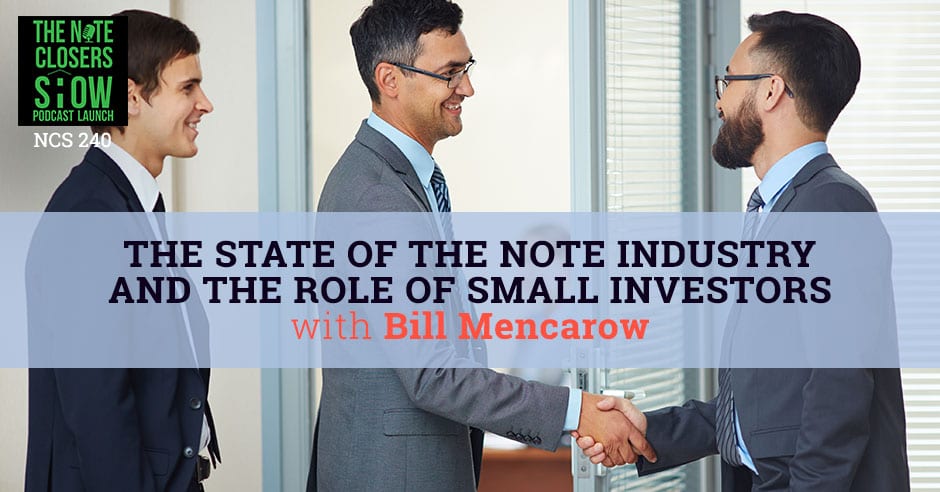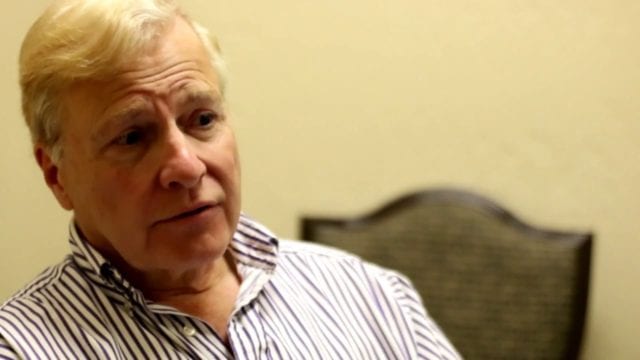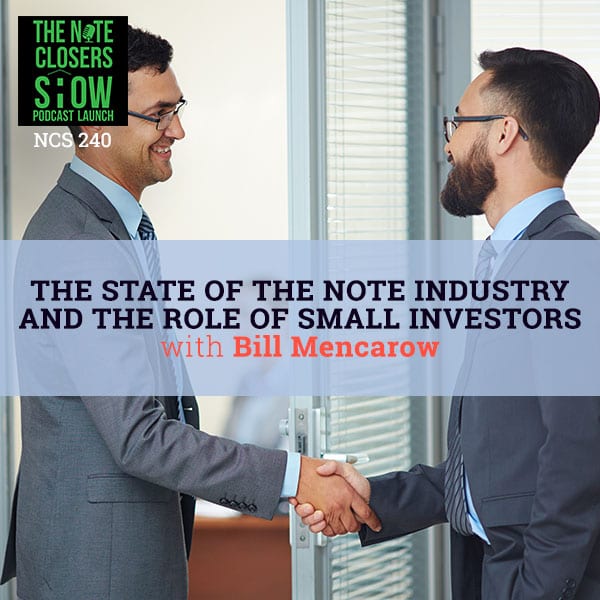
There are things in the note industry that you learn along the way even after attending online classes. Getting out there and doing business is the best way to get experience and knowledge. Bill Mencarow, founder of The Paper Source Inc., has been in the note industry for over thirty years and has learned a lot. He uses this knowledge to help other note investors. Being an advocate of note investing, Bill shares his insights on the state of the note industry.
—
I’m very honored with this episode with the one, the man, the myth, the legend, Bill Mencarow. Bill has been somebody that I’ve looked up to over the last few years as I’ve gotten to know him and seen that the quality that he does his business with. He does things a little bit differently than a lot of people which is great because we all can carve out our own little niche in the note industry. Bill has been a note advocate and a note investor resource for over 30 plus years. Bill has always been more of a performing investor versus non-performing. I love what he does with the PaperSource Symposium, what he’s done with the PaperSource Online, his online website and newsletter. I would totally recommend that you check that out if you get a chance to.
Bill runs a very clean event. He brings in a lot of people that are actually doing the business and not teaching on the business for the most part. They do teach but they’re in the business on a regular basis. If you’ve ever been through one of our virtual note buying workshops, his events are one of the ones that I recommend people go to network. Consistently, he draws in 300 to 400 plus people to his events. They’re just a great networking aspect, whether you’re in the owner financed game, the first, or the seconds. He focuses usually on the first day of his workshops and then seconds on the second day, so keep that in mind. There’s often a really good aspect of things, good knowledge, good content base, and you really can get down to the nitty-gritty, the nuts and bolts, at his PaperSource Symposium as well. I’m really very honored that he would join us on The Note Closers Show. You’re going to enjoy this, especially some of the questions that we ask Bill to try to keep people off track a little bit so we can catch him off guard. It’s always good to get a genuine answer from something that they’re not expecting.
—
Listen to the podcast here
The State of The Note Industry And The Role Of Small Investors with Bill Mencarow
We’re so honored to have our guest on this episode. He is a man that really needs no introduction if you’re in the note industry. This man is well known, a huge advocate for the paper and note investing. This guy has been around and helped thousands and thousands of note investors, new and seasoned, along on their business. We are so honored to have the man, the myth, the legend, Mr. Bill Mencarow. You’ve done a lot of amazing things in the note industry and been a really big advocate. Would you mind sharing with everybody here how you got your start as a note investor and before that because you’ve got a really cool backstory before you became a note investor.
Very briefly, as far as getting started, I worked on Capitol Hill in Washington for the US House of Representatives as a staff for a couple of members in the committee. I got a little money together and was able to put a down payment on a house to buy. I was just getting married. I talked to some people who were buying rental houses and renting them out. I started getting into that and I can credit my tenants for getting me into notes. A lot of people know that with notes, when a toilet backs up or something breaks, the tenant does not call the banker. He calls the owner of the house, the landlord. I like to be the banker rather than the owner of the house, although I do my own house as well. That’s how I got into it.
I first heard about notes by going to a Jimmy Napier seminar near Chipley, Florida. The locals call it LA which is Lower Alabama. It’s the redneck Riviera but it’s a cool place, I love it. I started talking to these people there and they said, “What if you invest in notes?” I didn’t know what they were talking about. Musical notes? Everybody starts knowing nothing. Nobody is born knowing the difference between a mortgage and a trustee. These are things you just learn along the way and never be afraid to ask questions. In a thumbnail, that’s how Alison and I got started. Alison is my wife and my business partner.
Most people know her probably better than me because she’s the face of our meetings. The first contact you have with the PaperSource is usually Alison. She’s been my partner ever since. She’s the one who when we look at a note and I say, “This looks like a good note. We should really look at it.” She says, “What about this? What about that?” “Yeah, I didn’t think of that.” In fact, we’re working on one just like that. It’s got all sorts of little peccadillos about it that we’re trying to work out.
You started the PaperSource online back in 1987, is that correct?
That is absolutely correct. It wasn’t online at the time. We stuffed envelopes and sent out US mail. Our Paper Source Journal is published every month and it runs eight to ten pages a month of articles. It is still a print, a newsletter. We do send out some electronics if people want it. Most of our subscribers still want to hold something in their hands so that’s what we do.
I love the online edition. I love the emails that you send out on a regular basis of newsworthy notes and things that are going on, and things that we should look at and keep in mind. A lot of people take that for granted. I know that I like reading something in my hand anyway, but it’s always nice to get those updates and see what’s going on in the industry. You started the PaperSource Convention when exactly?

Note Industry: Everybody starts knowing nothing. Never be afraid to ask questions
The first convention we had was in 92 Crystal City which was in Arlington, Virginia across the Washington DC area. We did those until ’99. The business started changing dramatically. Marriott Hotel wanted us to sign a $40,000 guarantee for the next year. We saw how things were changing in the business, companies were going out of business that bought notes, sold notes. Things were just changing so we stopped that and started doing cruises in the early 2000s. This will be our sixth year now for doing our latest incarnation, which is called the Note Symposium. It’s on April 26, 27 and 28, Thursday through Saturday.
I don’t want to look like I’m trying to sell something. We’re at the PaperSourceSeminars.com. If somebody wants to take a look at it, come to it. We had a little over 450 people last year. It’s a great networking opportunity if nothing else. What I try to do is get people to teach who are actually in the business. They come out of their offices and they teach for us, and then they go back to their office doing notes. They’re not on a similar circuit 100% of the time for sure. We like to get real people there. That’s PaperSourceSeminars.com. If people are interested in that, that would be wonderful.
It’s probably the best networking event in the note industry out there. You actively invest in notes. What’s your bread and butter? What’s your favorite thing that you like doing? Is it owner-financed notes? Is it institutional notes? Is it a first or seconds?
Everybody does things differently. You do things differently. I’ve never really gotten heavily into non-performing. I have non-performing notes but not on purpose. We do mostly performing notes. We’ve done some card paper investments, which actually worked out very well. That’s a numbers game. You can’t just do one or two. You got to buy a bunch because when you buy collateral that has wheels that can be a problem. It’s mostly performing notes. First, we bought seconds. We’ve done okay on seconds. You can get them a lot cheaper and you can foreclose. Hopefully people didn’t foreclose from a second position, but yes, you can. I’m not really put off by a second. I’ve never gone and do anything more junior than that. We’re making an offer on a performing note. It’s a first and we hope to get it. We pretty much have a line on it to get it at a double digit yield, a low double digit yield but you can still do those things. They’re out there.
The nice thing about a performing note is you can get a lot more information than you usually can with a non-performing note. It’s out there. That’s more or less our bread and butter. We do invest in rental housing, we still do that. Do it on the various ways that minimize our management, create a profit as you’re going in. They always say, “Know what your exit strategy is when you’re going in, whether it’s a note or a real estate.” We always try to figure out what is our exit strategy in case this doesn’t work out or in case it does. X number of years from now, I want to liquidate some of our portfolio. That’s where we’re at.
Are you buying your rental homes around your neck of the woods?
Absolutely. I don’t have any rental houses more than about fifteen minutes from my house. I don’t want to be driving an hour to deal with a realtor or to meet somebody who wants to rent a house and never shows up. We minimize all that. We do our own management. We got this portfolio of rental houses. I do have to put it in a blog to a couple of people who have been my mentors and been extremely wonderful to me in the single family rental house area, and that’s John Schaub. His website is JohnSchaub.com. Another good friend is Pete Fortunato and his website is PeterFortunato.com. Both brilliant guys in the single family and note investment area as well. John and Pete both teach note investing for personal investment.
You like performing notes. We get people all the time that ask us, “Where do I find notes?” We talk about going to institutions but there is so much paper out there on the owner-financed side. Is that what your bread and butter of finding performing notes, on the owner-financed side or institution side? What do you prefer?
I prefer on the finance. We look for owner-financed paper. We’ve tried dealing with institutions. It’s not easy to do when you’re looking for performing paper. They don’t understand what you’re talking about. They have a different language. You can’t just walk into the bank and buy one note. They want to sell you a multimillion dollar portfolio, if they want to do that at all. We’re dealing with personal funds so we’re not doing that. We look for owner-financed notes.
Let’s talk a little bit about car paper because I get some questions about car paper. Based on everything I see, that’s the next bubble burst. Are you seeing that as well out there? You said you invested in auto loan. They’re auto paper debt as well.
We have in the past.
Are you doing any of that recently or keep up with that?
No, we haven’t done it recently. It’s not because we’re opposed to it, it’s just that there’ve been other things going on. I certainly don’t pull myself out of the next print on car paper. The only thing I can say is that it’s a numbers game. Don’t think you’re going to go into a car lot and buy a few notes. You need to buy a bunch. They have great yields but they have wheels, too. People can default. If I were looking for car paper today, I’d look more high-end. The better customers are less likely to default on their notes. Unlike a house where you buy non-performing paper and you can rework the terms with the borrower or if you have to take the house back, you’re not going to do that with a car. That’s risky.
I’ve got a buddy here in town who owns a used car lot. He offers financing help. Since he’s the bank, he can sell the car that’s got a Blue Book value of ten for eighteen. He has a switch on it that if they don’t pay every two weeks, it turns the car off no matter where it is.
That’s cool. I like that.
He was telling me, he would sell his papers from customers looking in to buy it immediately$0.85 on the dollar for the most part. If the paper’s rate is between 12% and 18% interest rate, it turns out to be a pretty good idea. He says it’s a lot of maintenance. It’s a lot of tracking people down. You don’t get the best quality of borrower. Nothing wrong with that because everybody needs a car but it makes for an interesting time sometimes.
If I were going back into it, generally at some point I’d look for paper on higher end vehicles, paper, for example, on the OTR Drivers, Over the Road Drivers loaning on rigs. They don’t want it to fall. They don’t want to lose the rig. That’s another possibility. I don’t know what yields are today because I haven’t looked at it in a while. We were pulling in about 35% yield.

Note Industry: The time of the small investor going in and making a huge yield, that train has left the station.
Where do you see the market at? With you running your event and keeping track of everything, where do you see the market going? Obviously there’s been a pricing increase across the board as we get a lot ROIs, I like to call them REO refugees coming in to the game trying to buy properties or landlords that don’t want to be a landlord and they want to be a lien lord, increasing prices. Where do you see the distressed market going? We’ll talk about the owner-financed market after that.
The distressed market is certainly investment du jour, investment of the day, extremely popular. We get more inquiries about the non-performing paper certainly more than ever and possibly more than we get of any kind of paper. I often refer them to Scott Carson as the nation’s expert on that. It’s still growing. As you know very well, the universe of non-performing paper has shrunk. Foreclosures are at low levels since they have been for many years, so the market is tightening for a lot of people. The time of the small investor going in and making a huge yield, that train has left the station, in my opinion.
From what I see, a lot of small investors, one of the most common questions is, “Who can I hire to rework these notes and to renegotiate them and to get them performing again and service them?” The experts that I know says you really got to do it yourself. There’s no company out there that’s a full-service company where you buy the note and they’ll take it over and make it re-performing and you sit back and collect the money. I warn people about that. I will also warn people that it’s best to go out and find the non-performing paper, rather than going to a “fund’ and buying their paper.
There are great funds out there. People have done very well with funds, but there are also some horror stories. If you’re considering looking at some company that says that they have notes for sale with their attractive deals on non-performing notes, really check them out. What I do with any company or anybody I’m not sure of, I just go on the internet and I type in the name of the company or the name of the person. I do various searches. I put “fraud, scam, rip off” and see what comes up. Just like Yelp or anything else, some people will say this is the greatest thing in the world, and some people will to say it’s the worst thing in the world. You have to use some common sense. If you see a lot of negatives, back off and look for somebody else.
The funds, I have them ruled out the last couple of years because they were the easiest low-hanging fruit, they’re also in the prospect of making money as well. When they go up pricing when you’re buying for a fund just doesn’t make sense most of the time. You got to go out and find the paper yourself. You’ve got to spend the time doing the due diligence, whether it’s calling the regional banks or reaching out online and mailing out to servicers or whatever it is to find that paper, you have to do it. You hit the nail on the head. The day of the $15,000, the $25,000, the $50,000 investor, whether just buying one or two notes, I don’t think there’s a place for it. That’ll be a non-issue right now. They’ve got to be raising capital to buy bigger chunks. Those with bigger pools, you’re getting better pricing and a lot more options my opinion.
We see it all the time. When somebody call us up, “I got $10,000, $15,000, I want to buy a note.” I’m like, “You could probably buy one. It doesn’t mean you’re going to make any money on it.” You’ve got to be careful. In today’s world, with the use of the internet and technology, we have lost our patience. You said something very good at the beginning. You said that Alison looks at your deals. When you’re all excited, she looks at the deals to bring you down. I don’t think a lot of people have that. They’re like, “It looks good.” They’re always looking at the best case scenario versus looking at the what-ifs.
You’ve got to have an exit strategy. You got to say, “Okay, what can go wrong? What are all the things that could possibly go wrong and how am I going to deal with those if they happen?” If you can answer those questions and you’re happy with the outcome of each of those things happening, and you’re happy with the way you’d handle them, then maybe you want to go for it. I do want to mention a couple of things related to that. I believe we’re going to see interest rates go up. They’ve been on historic lows. In fact, when I say historic, I mean historic. There are studies that I’ve seen that actually they know what the interest rates were back in ancient times, Babylonia, Biblical times. I have a chart we published in the Paper Source Journal showing interest rates going back 5000 years. They have never been lower in 5000 years and they have been here in the last few years and around the world. There are some places, I don’t remember all the countries but there are half a dozen countries mostly in Europe, I think Japan is one of them, where they have negative interest rates, where you pay the bank to hold on to your money. You deposit $1,000 and you’ll get back $925 or something in a year so it’s crazy. Those days are over.
You look for ten-year US treasury yield. It’s just about ready to break. It’s 2007 high. It hasn’t been this high since then. I believe rates are going to rise around the world. It means that mortgage interest rates are going to go up. That means more defaults. It means fewer people will be able to qualify to buy a house, and it will be more owner financing. From the note investor perspective, that’s a good thing. We are going to see more default in paper. We are going to see more owner financing. When somebody wants to sell their house and people can’t qualify to sell a house, what do you do? As a home seller, you can offer to what they call owner financing to hold the paper either as a first or second. We’ve seen that before. We’re going to see that again.
The other thing is the Consumer Financial Protection Bureau, CFPB, it’s been a thorn in our side along with Dodd-Frank and the SAFE Act, a lot of things in it that cause all problems. The CFPB has taken it upon themselves to determine whether your yield when you buy a note is fair. They can actually come in and say, “You bought that note at a 12% yield. We don’t think that’s fair so you need to drop your yield.” They do a lot of things. They’re putting people out of business through their regulations. That looks like it’s over. Mick Mulvaney is the new Director of the CFPB. He just announced he doesn’t want any more money for his bureau. He says, “We have plenty of money. We don’t need any more.” That’s unheard of. In fact, he put out a press release saying that CFPB is pulling back their regulations. They’re not going to write any new regulations. They’re just going to enforce what the law tells them they have to enforce and leave it at that. That’s really good.
Another thing on the Washington scene is the Trump Republican Tax Bill. It’s going to be tremendous for note investors. If you have what’s called a pass-through entity which is an S corporation, a limited liability company, LLC, a sole proprietorship, or partnership, you’ll be able to deduct 20% of your note income off your taxes. Not just to your expenses, but your income 20% starting next year. That’s tremendous. Senate Bill 2155, which is in the United States Senate right now. Senator Crapo from Idaho, rolls back Dodd-Frank to a great degree. It’s in the Senate Banking Committee. That has 23 Senate co-sponsors, which is almost half the Senate. It’s equally divided among Republicans and Democrats. A lot of good things are happening for note investors, for real estate investors, and for general business. The economy is doing great and greater things are on the horizon.
With the market changing like it is, interest rates have no place to go but go up, I think we saw a little bit of correction last week with the market changing, I crack up daily on the Bitcoin post with all the Bitcoin experts out there talking about what’s going on. I still believe the best investment is something sawed as an asset in real estate. Everybody’s always going to need a house to live in. What is your opinion on the new contract for deeds that are hitting the market? We see a lot of that on the low-level pricing, especially coming from the Harbor Portfolios, the large funds that bought large pools of areas then turned around and then offered owner financing the contract for deeds. Are you positive on those or mixed reviews or are you buying that stuff. What was your opinion on this?
I’m on an advisory capacity to a commission which has been drawing up those suggested regulations for contracts with deed. There is a lot of pushback on contracts for deed. A contract for deed means that the buyer of the house never gets the title until the mortgage is paid off or the contract is paid off. The seller of the house holds on to title and they basically are just paying the seller of the house, and at the end of twenty years or ten years or thirty years, whatever the contract might run, they don’t have a title to that house. You got to trust the seller of the house not to go, for example, sell it again because he or she is holding the title. There’s a lot of pushback about that. There’s a lot of fraud. Obviously it lends itself to fraud so I would be concerned about the regulatory environment. There are going to be more of a crackdown than there has been on who can do contracts for deed and how they could be written. That’s an area that I’d be afraid to be buying these contracts from these companies that have bought thousands and tens of thousands of rental houses and selling them for contracts for deed. That scares me.
It increases the opportunity for fraud. Have you seen some examples that you want to share or fraudulent contracts for deed that you’re talking about?
Off the top of my head, I don’t have any personal examples. I can cite news stories that I’ve read in the last year so where people have come in and ripped people off with contracts for deed. These are mostly on low-end houses but it’s so easy. If you buy a low-end house and you sell it to some poor people who don’t have representation, and you hold the title, what’s going to stop you from doing that again and again on the same house? They try to find you and you’re in Europe somewhere. If I were going to buy a contract, I’d have it converted to a mortgage or a trustee, depending on what state it’s at. Most note investors that I’m familiar with, not all but I know a lot of them who are full time businesses as national note investors or regional note investors, want contracts for deed converted to mortgages or trustees.

Note Industry: That’s the power of networking. It just can go on forever.
We’ve bought some of those contract for deeds and went into the process of converting a chunk of them, definitely when the borrowers haven’t been paying a while. We got some equity. Definitely converted them to mortgages so it makes it a little bit easier. It makes it more an attractive paper and it incentivizes the borrowers with even more equity on the deal because they are untitled at that point, which is a good thing.
If you would come to me with a contract for deed, I’d want it to be converted, too. As an investor, if you were selling these to investors, I’d be more interested obviously in a mortgage or a trustee than a contract for deed.
Where are you finding your owner-financed deals? Where are you finding your deals that you’re buying? Do you go into public records? Are you just networking? Are you using your list of contacts? Where do you find your deals these days?
It’s mostly personal networking. That’s a base-building thing. It takes a long time to build up a base. Every so often, I’ll have an accountant or realtor call me and say, “I know you’re buying notes and here’s one that I became aware of.” When you’re doing this, you’re thinking about who is in the position to see notes on a regular basis? People, as I said, that are lawyers, estate lawyers, mortgage lawyers who handle estates particularly see notes all the time. Divorce lawyers see notes all the time. CPAs, people who work at title companies, see notes all the time. Realtors, real estate brokers. You just think, “In the course of their daily work, who has notes come across their desk?” Those are the people that you want to get to know. Let them know you buy notes. Over the years, you’ll see that your phone starts ringing and your emails will be coming in. Your texts will be coming in.
I was at the John Schaub seminar in Florida. The fellow sitting next to me is a PaperSource subscriber, which I didn’t know. He said, “I have a note I’m interested in selling.” We ended up buying it. Personal contact is what works best for me. If you’re just starting out, you might try some ads. Go on Craigslist, it’s free. Why not? Give it a shot. The thing about Craigslist is you have to keep putting up because you get knocked out of the list, but it doesn’t cost you anything. Start out with things like that and personal networking.
I used to always early on, because I get the foreclosure list taking place here in Travis County or Bear County in San Antonio. I would scan down to find a one-off foreclosure taking place and it was often a different attorney that was handling the sale versus everybody else with the bigger banks. Those were the attorneys that I love calling because they were putting deals together. They were also the local attorney that knew how to do the owner-financed that realtors would send them deals. They’re a great source. That’s a great recommendation on that, Bill. If you were a brand new note investor, coming from the fix and flipside real experience, where would you start? What would you do if you had to start all over again?
If you had to start all over again with the knowledge that you have, where would you begin in today’s market?
I would start by learning more than I did when I first started out. I jumped in too quickly and made some serious mistakes, both in notes and real estate. I didn’t have the opportunity that you have currently. There was no Scott Carson out there, no WeCloseNotes.com. These days, you can find a mentor. You can get much more education. I encourage people, I’m sure they already are but if they’re not, to go to your website and to see what things you have to offer. Scott will be a great teacher for you. That’s what comes to mind. I didn’t even know the questions I should be asking, much less the answers to them. Just be careful. There’s too many mistakes you can make. You can jump in too quickly or you can have what they call the paralysis of analysis. I’m sure you know people like that. I remember being at a Jimmy Napier seminar back in the early 80s talking to a man about notes and I didn’t know that much about it. He said, “I hadn’t bought any yet. I thought I should take as many seminars as possible,” which makes sense.
He says, “Then I got a real estate license just to get more information but I didn’t think that was enough so I got a real estate broker’s license. I hadn’t bought any notes. I think I needed an MBA before I buy.” That is the greatest example of paralysis of analysis. I just can’t get around that. Let me go back to something you said. We’re talking about finding notes, which is on top of everybody’s list of questions. One way we found a note through networking is that we were on a cruise ship. It was a dive cruise and scuba diving, and we met this couple. We became friends with them and socialized with them over the years, and then lost touch with them. They broke up. Probably ten years after I’d seen the guy, Tom, he called me up and he had a note. He said, “I remember that you bought notes.” I barely remembered his name but he remembered that I bought notes and it was a wacko note. I mean, it was really bizarre. We were able to put together and do some deals with him. You just never know who you meet ten years from now who might have kept your card or find you in their old email batches or whatever it is. That’s the power of networking. It just can go on forever.
You never know who you’re going to talk to or whoever’s going to show up, your blast from the past.
I’ve seen people who have those magnetic signs on their cars that “I buy notes. Call me,” and their phone number. Who knows? Why not?
It doesn’t cost anything. You’re getting the word out. A lot of people are scared, especially if they’re working at job full time, about making that transition to a full-time note investor. Scared somebody’s going to see it. Scared their boss is going to get upset at them. Do you have any insights or any pointers you want to give to anybody out there who’s looking at making a transition like that who’s feeling that fear right now, Bill?
It is scary to think, “Am I going to go in this full time?” I always say, “Let your note business tell you when it’s time to quit your job.” Don’t just quit your day job and say, “I’m going to go in the note business full time.” That’s doing it backwards. Get to the point where you’re spending so much time on your note deals and making so much more money than you make in your job, then that’s a real good indication that it’s time to make that move. Until then, do it part time.
I had someone call me yesterday, “I got to close on a deal in 30 days.” I’m like, “You probably be able to get a job.” It’s just the truth of the thing. If you’re brand new at any type, you don’t have real estate experience or things like that, “I got to pay my mortgage in 30 days.” You need to go to a job because if you’re stressed out financially, you’re not going to make good decisions when it comes to investments. Most of the time, you can overlook some stuff because you’re going to try to squeeze it around and peg it into a square hole and it could end up biting you in the butt and you’d be in a bad situation. I’ve always said the note business is not a get rich quick scheme. It is a get rich over years aspect of things of adding deals.

Note Industry: You can work out the problem. Find out what the problem is. The problem often it’s not a money problem.
You and I both know this, whether it’s performing or non-performing, you never know which way it can go. We’ve had non-performing notes we bought that turned into re-performing notes really quickly but then we’ve got others that were performing that we ended up having to take into foreclosure. It is what it is. I heard somebody tell me one time that you’ve only taken a handful of the notes that you have bought that turned into non-performing to foreclosure. What’s your secret for getting things done without having to go all through the foreclosure process?
Actually, Scott, what you heard is not accurate. I did say in an interview that, as far as I can remember, we had one foreclosure over the past 30-something years. My wife Alison reminded me that I was totally wrong. We’ve had no notes go to foreclosure. I was thinking of a rental situation we had to take out to court over stealing the building dishwasher.
I got to say it’s just personal working with people. I don’t want to throw somebody out of their house. That’s probably a fault of mine in that we have let people slide on payments and pat them on the backend or it’s Christmas, they’re having problems, “Skip a payment. Merry Christmas.” That way, you work up a relationship with your payers whether they’re renters or whether they’re note payers, and try to work things out with them. Try to have a personal relationship with these people. We don’t socialize with them but we have a personal relationship. I got a great note from a tenant who moved out and had been with us for a number of years and I said, “I want to compliment you. You’ve been a wonderful renter from us and if you ever need a place, please consider us again. It’s really hard to find good tenants.” She wrote back and she said, “You may never thought of it this way, but for a tenant it’s really hard to find a good landlord.”
If you have this relationship with people, you can sit down, you can work out the problem. Find out what the problem is. The problem often it’s not a money problem. There’s something else going on that they can’t make the payment but it’s because of some other situation. Look at it. Try to be a psychologist with them and sit down and be their financial counselor. So far, we’ve been blessed that we have not had to go to the extreme of foreclosure with people. We’ve got half a dozen ways to work it out that doesn’t involve foreclosure. One is paying them to move, just paying them to go away because they can’t afford to move. That’ll be a lot cheaper than foreclosing or eviction if we just dip in our pocket. In the long run, we’ll be better off that way.
Offering the cash for keys is really effective. We just agreed to cash for keys recently with borrowers. I was like, “You’re not going to be able to make the payments. You’re behind. Obviously, you’re missing. You’re bouncing checks. Let’s just go ahead and call it what it is. Let’s work out a situation here to get you out of a bad situation to something good.” It’s unfortunate that we’ve got to play counselor to our borrowers sometimes too.
That’s what I’m saying. Sit down with them. Try to find out what the situation is. Don’t think of yourself as “I’m the creditor, you owe me money, so pay up or get out.”Sit down with them and see how you might be able to help them out. Maybe you can restructure a loan with them. You can move them into another house. As I say, pay them to move. Pay them to go away. Think about it and think about your options with them. At least it’s worked out for us.

Note Industry: The more educated you are about a subject or a property or an area or an industry, the better off you’ll be in the long run.
What are you doing when you’re not note investing? What’s the thing that recharges Bill?
I mentioned scuba diving. I like business so what joy is working in another business? We have a vacation rental business so we do a lot of vacation rentals in the Cozumel. We have a condo in Cozumel and one near Corpus Christi in Rockport. We rent those out.
I’m from Aransas Pass-Ingleside so I’m very familiar with Corpus Christi in Rockport area, the Texas Riviera, as I like to call it. You could be seeing probably some defaulted notes down there after the hurricane, too?
The eye of Hurricane Harvey came right over our condos. Surprisingly, with little damage. We had a few leaks and that was about it. Other places got completely torn apart. A third of the structures in the town are gone. It was tough. We like the vacation rental business. Mostly when we travel it’s on business but we have the opportunity to have some fun, too, so we do like to travel. I like to spend time with our Springer spaniel and he’s the love of my life, so that recharges my batteries for sure.
Do you have any recommendations for people? Where do you find your news? What do you read on a daily basis? Are there any websites that you recommend people subscribe to?
Yeah, quite a few. HousingWire.com. I look at Realtor.com. I look at FoxNews.com. FoxBusiness.com, CNBC. I look at Drudge every day. A lot of times, I’ll pick up Financial News. I blog almost every day on PaperSourceOnline.com. I try to send out weekly, if the news warrants it, news articles of interest to people on note and/or real estate business. If people are interested in that, they can go to PaperSourceOnline.com. Hit the Contact Us button and just let me know if you’re interested in being on that mailing list where you get weekly or every two three weeks, whatever it is, news on the note business and real estate business. Those are the major ones that come to mind. NewAmerican.com is another one I visit on a pretty regular basis for news. I look at Scott Carson’s website quite often to see what I can steal.
For the most part, the note industry is a pretty giving group of people, very networking. Joel Markovitz coined a term a few years back about coopetition. We’re all out working for our business but we’re all willing to share resources or share tips to keep people from making mistakes. You would agree with that, won’t you Bill?
If I hear one comment about the industry as a whole, that’s the comment that I hear from people, particularly people new to the industry. They come to our events, and I’m sure they come to yours and say the same thing, participate in yours whether online or in person. I can’t believe the willingness of people to share. People who have more experience are willing to pass it on to people who are just getting started. That is a hallmark of the note business. I don’t know if it’s that way and it’s certainly not that way in politics I spent most of my life in politics, I still do run campaigns once in a while. That’s not as common but it certainly seems to be in the note business. People are always willing to help, always willing to talk to you. It’s great from that standpoint really because people understand the importance of passing it along.
Bill, I want to thank you so much for taking time from your busy schedule to join me here on the Note Closers Show. I know that people definitely appreciate it as much as I do. If I can be of help with anything, please don’t hesitate to reach out. Once again, him and Alison are running an amazing event. It’s April 26, 27, 28 in Las Vegas. Where is it going to be?
At the Tuscany Hotel and Casino, just off about a couple of blocks off the strip in Las Vegas. It’s a really neat hotel. It looks like a 27-acre college campus type environment. It’s a nice place to be. I appreciate your telling people about it. Anything we can do for you guys, anything in the future, just let me know.
Thanks, Bill. I appreciate it. That will wrap it up for this episode of The Note Closers Show. Go out and make something happen. Go out and check PaperSource Online and the PaperSource Symposium. You won’t be disappointed. I love getting Bill’s emails ton what’s going on in the industry. It’s just a great source of information, and that’s what it is all about. When you want a decision on something, the more educated you are about a subject or a property or an area or an industry, the better off you’ll be in the long run. Go out and make something happen. We’ll see you all at the top.
Important Link
- Bill Mencarow
- PaperSource Symposium
- PaperSource Online
- Jimmy Napier
- JohnSchaub.com
- PeterFortunato.com
- Blue Book
- Consumer Financial Protection Bureau
- Mick Mulvaney
- Senator Crapo
- HousingWire.com
- Realtor.com
- FoxNews.com
- Drudge
- Joel Markovitz
About Bill Mencarow

The Paper Source, Inc. was founded in 1987 by W. J. Mencarow and his wife and business partner Alison. He and Alison have been note investors since 1981. He is the editor of THE PAPER SOURCE JOURNAL and she is the publisher.
In addition to numerous articles in THE PAPER SOURCE JOURNAL and other publications, he is the author of the guidebooks “How To Get Started In Notes Without Using Your Own Funds,” “Almost Everything That Could Go Wrong With A Note and How to Prevent It” and several seminars. They received the coveted Founder´s Award for starting the first nationwide cash flow publication and first industry national convention and were inducted into both the Mortgage Report Hall of Fame and Metropolitan Mortgage´s Note Industry Hall of Fame. He received the Noteworthy Note Industry Achievement Award, and in 2014 he was recognized as the “Note Educator Of the Year” by the Note Investors Summit.


One Comment on “EP 240 – The State of The Note Industry And The Role Of Small Investors with Bill Mencarow”
Great interview!! Thanks for posting.